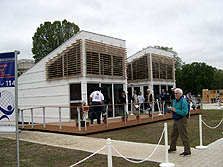

Puerto Rico decathletes were seen singing and dancing this morning. Nothing can dampen the spirits of the competitiors.

The Florida house had long lines of people all day taking tours. Its design is one of the favorites here on the Mall.
Solar Decathlon 2005
Daily Journal — October 13, 2005
Afternoon Update
They say that to do something great in life it has to have significance. The significance comes from making a difference, either in your life or the lives of others. The Solar Decathlon, which I am blessed to be out here participating in, has both. This event is turning students into leaders, and disbelievers into believers.
Two years ago, when most of these students joined their respective Solar Decathlon teams, little did they know how hard the task ahead of them was going to be. From the long hours designing and building a house from the ground up to the demanding requirements necessary to build and operate a house on the National Mall, competing in the Solar Decathlon is hard. For those with the right stuff, it has built character and leadership — qualities that will change their lives for the better. That's significant.
To power a house day after day on sunlight is a technological accomplishment that many find hard to believe — especially in cloudy weather. What these teams are proving out here is that solar energy really works and energy efficiency pays off. Considering the consequences of billions of people around the world burning finite fossil fuels at an ever-increasing rate, demonstrating technologies that can make a difference is significant.
But demonstrating homes is only part of it. We are coming to the final stretch of a very exciting competition. The scoring remains tight and we surely won't know who wins until 2 p.m. Friday.
On Thursday, points were awarded for Documentation. This contest evaluates the quality of documents submitted for the schematic design, design development, construction, and "as-built" phases of the Solar Decathlon project. Up to 100 points were available based on the evaluation from a panel of judges who scored each team's submittals. Starting with a fourth place honorable mention, the University of Michigan received high praise and 83 points. Virginia Tech was third and received 85 points. Their documentation received praise for both content and visual style.
The Universidad Politécnica de Madrid received second place honors and 89 points. Their drawings set a new standard for the competition. In fact, one judge was quoted as saying that the entire Madrid submittal serves as an effective case study, and that it "goes beyond just being an effective set of drawings. It is a wonderful exercise in effective communication."
The first place team for Documentation, the University of Colorado, performed well in all four components of this contest, a proven key to overall success. In particular, the energy analysis report was, in the words of the judges, "a tour-de-force." One judge said, "This is how it should be done!" Congratulations to the Colorado team for receiving 92 points.
That shifted the ranking some, and helped Colorado solidify its lead. Now the last wild card is Energy Balance worth 100 points. Colorado, Cal Poly, and Cornell, the top three teams, will not be able to balance their batteries and will not score any of the 100 points. Virginia Tech, on the other hand, has a good chance to score a significant portion of the 100 points. If they can charge their batteries enough to get 60 points awarded, they could win the contest. That will depend on the weather in the morning. If it is cloudy, Colorado has the best chance to win. If it is sunny, Virginia Tech could jump ahead and win. What suspense! Be sure to keep your eye on the scoreboard.
Reporting from the village,
Richard King, Department of Energy
